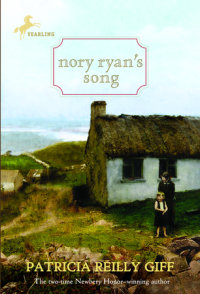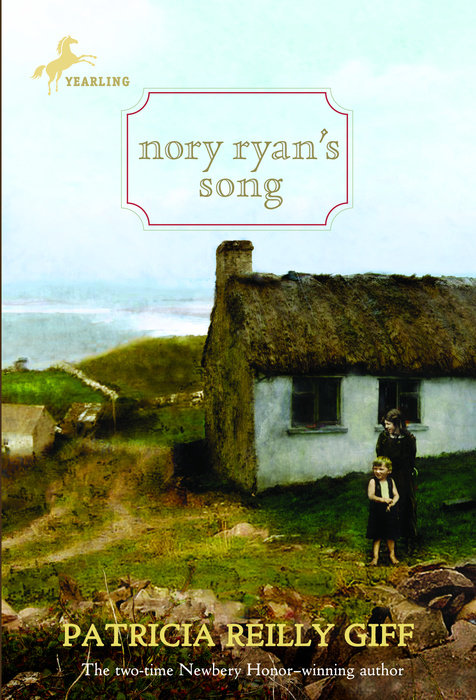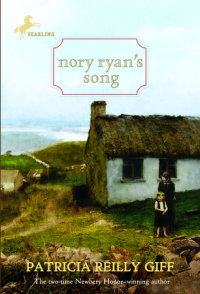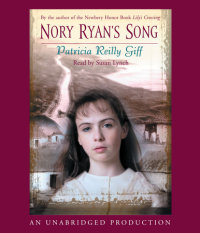CHAPTER 1
Someone was calling.
"Nor-ry. Nor-ry Ryan."
I was halfway along the cliff road. With the mist coming up from the sea, everything on the path below had disappeared.
"Wait, Nory."
I stopped. "Sean Red Mallon?" I called back, hearing his footsteps now.
"I have something for us," he said as he reached me. He pulled a crumpled bit of seaweed out of his pocket to dangle in front of my nose.
"Dulse." I took a breath. The smell of the sea was in it salty and sweet. I was so hungry I could almost feel the taste of it on my tongue.
"Shall we eat it here?" he asked, grinning, his red hair a mop on his forehead.
"It'll be over and gone in no time," I said, and pointed up. "We'll go to Patrick's Well."
We reached the top of the cliffs with the rain on our heads. "I am Queen Maeve," I sang, twirling away from the edge. "Queen of old Ireland."
I loved the sound of my…
CHAPTER 1
Someone was calling.
"Nor-ry. Nor-ry Ryan."
I was halfway along the cliff road. With the mist coming up from the sea, everything on the path below had disappeared.
"Wait, Nory."
I stopped. "Sean Red Mallon?" I called back, hearing his footsteps now.
"I have something for us," he said as he reached me. He pulled a crumpled bit of seaweed out of his pocket to dangle in front of my nose.
"Dulse." I took a breath. The smell of the sea was in it salty and sweet. I was so hungry I could almost feel the taste of it on my tongue.
"Shall we eat it here?" he asked, grinning, his red hair a mop on his forehead.
"It'll be over and gone in no time," I said, and pointed up. "We'll go to Patrick's Well."
We reached the top of the cliffs with the rain on our heads. "I am Queen Maeve," I sang, twirling away from the edge. "Queen of old Ireland."
I loved the sound of my voice in the fog, but then I loved anything that had to do with music: the Ballilee church bells tolling, the rain pattering on the stones, even the carra-crack of the gannets calling as they flew overhead.
I scrambled up to Mary's Rock. As the wind tore the mist into shreds, I could see the sea, gray as a selkie's coat, stretching itself from Ireland to Brooklyn, New York, America.
Sean came up in back of me. "We will be there one day in Brooklyn."
I nodded, but I couldn't imagine it. Free in Brooklyn. Sean's sister, Mary Mallon, was there right now. Someone had written a letter for her, and Father Harte had read it to us. Horses clopped down the road, she said, bringing milk in huge cans. And no one was ever hungry. Even the sound of it was wonderful. Brook-lyn.
The rain ran along the ends of my hair and into my neck. I shook my head to make the drops fly and thought of my da on a ship, the rain running down his long dark hair too. Da, who was far away, fishing to pay the rent. He had been gone for weeks, and it would be months before he came home again.
I swallowed, wishing for Da so hard I had to turn my head to hide my face from Sean. I blew a secret kiss across the waves; then we picked our way up the steep little path to Patrick's Well.
We sat ourselves down on one of the flat stones around the well and leaned over to look into the water. People with money threw in coins to sink to the bottom. Granda said that might be why it took so long for those prayers to be answered.
But not many people had coins to drop into the well. Instead there was the tree overhead. People tied their prayers to the branches: a piece of tattered skirt, the edge of a collar.
"I see my mother's apron string." Sean pointed up as he tore a bit of dulse in two and handed me half.
I nodded, sucking on a curly edge. I looked up at the tree. A strip of my middle sister Celia's shift was hanging there. Now, what did that one want? She had no shame. There it was, a piece of her underwear left to wag in the wind until it rotted away. Every creature who walked by would be gaping at it.
I stood up quickly, moving around to the other side of the well to look down at our glen. The potato fields were covered with purple blossoms now, and stone walls zigzagged up and down between them.
And then, something else.
"Sean," I said, "what's happening down there?"
Absently he tore the last bit of dulse in two. "Men," he said slowly. "Bailiffs with a battering ram. Someone is being put out of a house."
Someone. I knew who it was. A quick flash of the beggar, Cat Neely, her curly hair covering most of her face. And Cat's mother, who sat in their yard, teeth gone, cheeks sunken, with no money to pay the rent.
"Don't think about it," Sean said, his hand on my shoulder, his face sad. "There's nothing can be done."
"Coins," I said. "If only someone—" I broke off. I knew it myself. No one in the glen had an extra penny. Not Sean's family. Not mine. My older sister Maggie and Sean's brother Francey were saving every bit they could to get married. But even that would take years.
The dulse on my tongue tasted bitter now. Cunningham, the English lord, owned all our land, all our houses; he could put any of us out if he wanted. And now it would be Cat and her mother.
There was someone with a coin, I knew that.
Anna Donnelly.
Sean and I were afraid of her. He had said that one of the sidhe might live under her table. I shuddered, thinking of those beings from the other world. Tangles of gray hair, bony fingers pointing, crouched in the darkness. Anna had her magic, too. She could heal up a wen on the finger, or straighten a bone with her weeds, but only when she wanted to.
And she hadn't saved my mam the day my little brother, Patch, was born.
That Anna Donnelly had a coin.
And I was the only one that knew about it.
I thought of the day I had stopped near her house. The thatch on her roof was old and plants grew green over the top. And there was Anna outside, teetering on a stool, her white hair in wisps around the edge of her cap. She had peered over her shoulder, her face as wrinkled as last year's potatoes, then held something up before she shoved it deep into the thatch.
I had seen the glint of it, the shine.
The coin.
And in my mind now: I could save Cat Neely and her mother. If only Anna would give me that coin.
Suddenly my mouth was dry.
I turned to Sean. "Thank you for the dulse," I said, and left him there, mouth open, as I flew down the path away from the cliff.



